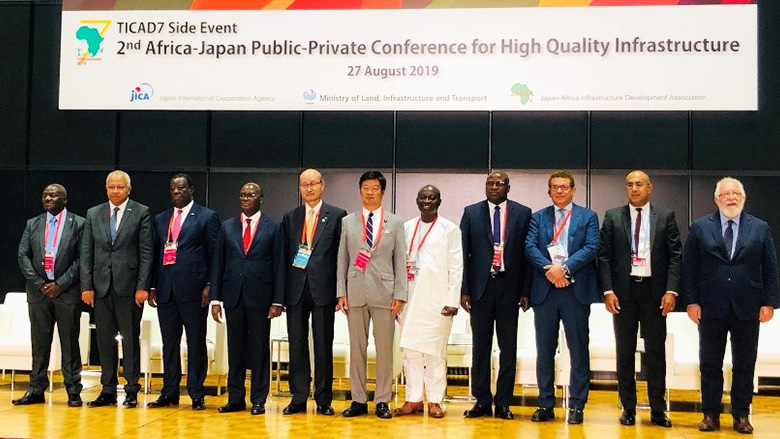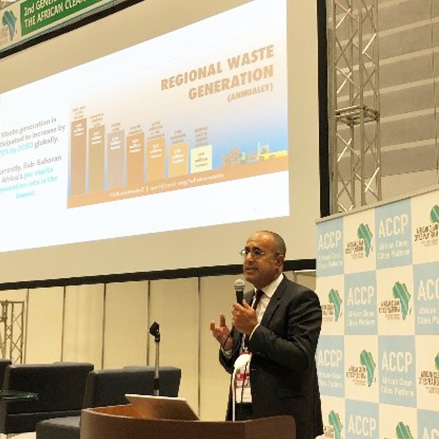August 28-30, 2019
Yokohama, Japan
Quality infrastructure investments maximize the positive economic, environmental, social, and development impact of infrastructure and create a virtuous circle of economic activities, while ensuring sound public finances. Africa is experiencing dynamic growth and is looking up to Japan for its experiences and technologies in infrastructure and urban development. Yokohama city of Japan aims to collaborate in high-quality urban development efforts, growing together with Africa, while contributing to the realization of the Sustainable Development Goals (SDGs).

The World Bank’s team – Global Urban, Disaster Risk Management, Resilience & Land Unit, coordinated by Tokyo Development Learning Center (TDLC) and Global Facility for Disaster Risk Reduction (GFDRR) participated in the 7th Tokyo International Conference on African Development (TICAD7), held on Aug 28-30, 2019 in Yokohama. TICAD was launched in 1993 by the Government of Japan, to promote Africa’s development, peace and security, through the strengthening of relations in multilateral cooperation and partnership, particularly with the country. TICAD7 was led by the Japanese government and co-sponsored by the United Nations, the United Nations Development Programme (UNDP), the African Union Commission (AUC) and the World Bank. The event observed the participation of over 10,000 participants from 53 African countries, 52 development partner countries, and 108 international organizations, public and private sector groups, NGOs, and more.

For TICAD 7, Sameh Wahba, Global Director, World Bank represented the Bank in the following activities: (i) moderated the Ministerial roundtable in the 2nd Africa–Japan Public private conference for high quality infrastructure, organized by the Ministry of Land, Infrastructure, Transport and Tourism (MLIT); (ii) presented the Bank’s flagship publication What a Waste 2.0 with a focus on Africa region, in the second general meeting of African Clean Cities Platform(ACCP), organized by JICA, Ministry of Environment of Japan (MOE), Yokohama City, UN-Habitat and United Nations Environment Program (UNEP); (iii) moderated session 3 in the 2nd Africa–Japan Public Private Conference for High Quality Infrastructure, organized by MLIT and presented the Bank’s approach to sustainable urban development; and (iv) presented a keynote address on the West Africa Coastal Areas Management Program (WACA) in the session on Integrated approach for climate change in sub-Saharan Africa, co-organized by JICA and the Bank.
Key Takeaways
Urban Development with QII
Sameh emphasized on the importance of quality infrastructure investment to achieve growth and sustainable development in Africa, by virtue of improving economic efficiency through incorporating life-cycle costing, integrating social and environmental considerations in infrastructure investments, building resilience against natural hazards and climate risk, and strengthening governance.
Realization of Sustainable Cities
In the 2nd Africa–Japan Public Private Conference for High Quality Infrastructure, Sameh moderated the Ministerial level sessions as well as a session joined by representatives from Cote d’Ivoire, Democratic Republic of Congo (DRC), Tanzania and Nigeria. The session indicated the rapid pace of urban transformation in African cities. Sameh presented the Bank’s approach to enable the development of sustainable cities in Africa, which includes efforts to foster growth and sustainable development, balancing the rising demands of affordable housing, tackling pollution, water and sanitation challenges, planning mass-transit and improved connectivity, and supporting urban expansion. The urban issues are also needed to be addressed in conjunction with land market, industrial cost, and therefore there is an even stronger importance of institutional coordination, regulatory reform and policy measures that fist to each context.
Financing Solid Waste Management
In the ACCP session on financing solid waste management (SWM), Sameh has highlighted how SWM is a complex challenge and it not only requires traditional financing, but rather an innovative integrated value chain approach. In addition, the inclusion of informal sector with cooperation from civil society and NGO are also crucial, given the non-formal sector counts around 30 to 50 percent of SWM.
In conclusion, he highlighted that policy reforms, public and private infrastructure investment, and resilience are the key solutions for sustainable development of African region.
“It is encouraging to see Japanese cities such as Kitakyushu successfully accomplished the path to decouple sustainability and economic growth.” Sameh Wahba, Global Director, GPURL, World Bank Group
Way Forward
The World Bank will be a partner in this TICAD initiative. The World Bank’s TDLC will continue to be associated with TICAD and promote policy dialogue between leaders of African countries and development partners on pressing issues facing Africa, such as economic development, poverty, and conflict.
